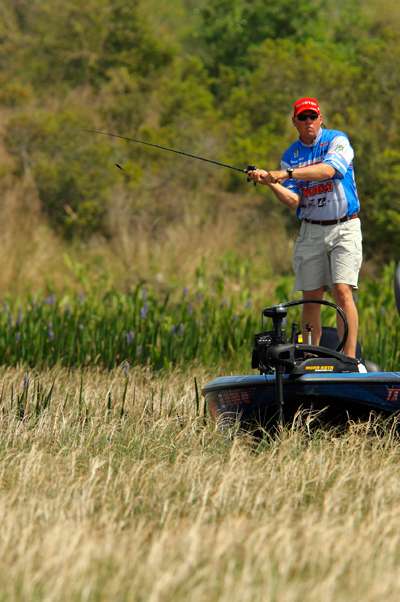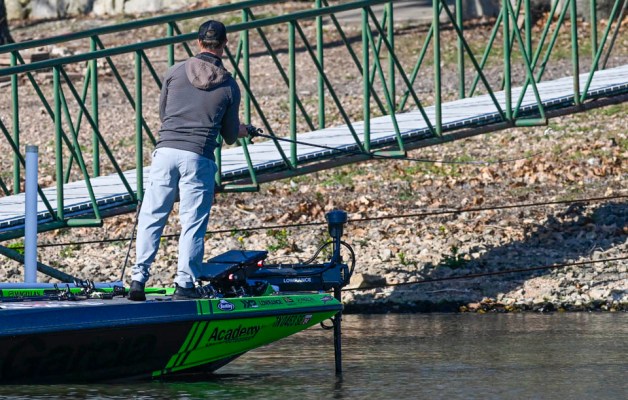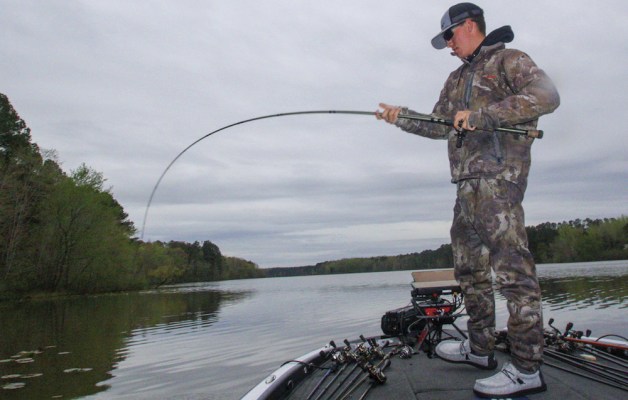
When Alton Jones attended college, his study habits were sidetracked. “I did as little of my homework as I could to get by,” he recalls. “In high school I was pretty good about doing my homework because I had some accountability with my parents.” Now that he fishes for a chance to win the $100,000 top prize of a Bassmaster Elite Series event, Jones has plenty of incentive to do his homework again.
“Fishing is a little different because my drive and desire to succeed in tournaments keeps me accountable,” he says. Homework becomes especially important to Jones when he sees new fisheries on the Elite Series schedule.
“The first thing I do is hit the panic button,” he says. “There is always a comfort zone when you have familiarity with the water, like at Guntersville in mid April I have a lot of experience there and have done well there. I know what kind of mode the fish are going to be in and some areas that are going to hold some big fish. So I am starting to form a plan.”
Before he can start formulating a plan for unfamiliar waters, Jones goes online to gather as much information as he can about the new tour stop. His first step is to research tournament results. “West Point is a perfect example,” says Jones. “I have never laid eyes on the lake, and it is coming up on the Elite Series next year.
So the first thing I am going to do is find out what I need to be catching to win and what I need to catch to do well. I want to know where the bar is set and what the winning weight on that lake is usually.” Tournament results can also give him some insight on which sections of a lake produce the biggest stringers. Other details he gathers from the Internet include the lake level history and the long-term weather trends for the area (available on www.weather.gov).
By researching the weather patterns for a couple of months, Jones can determine if the lake is in extended drought conditions that push the fish offshore or if torrential rains and warmer than normal weather has kept the fish shallow.
Surfing the Web can also provide clues about the lake’s water clarity. “I can find out if it is the same on the main lake and down by the dam as it is up the river,” says Jones. When gathering information from the Internet, Jones makes sure to check multiple sites. “You have to be careful and take some information with a grain of salt,” he warns. “You can’t really rely on it as gospel truth. If I can find multiple sources corroborating the same thing, then I figure there is something to it.”
Map reading is the second step of Jones’ research on unfamiliar waters. Laying a paper map on his bed and looking at it from a distance helps Jones quickly determine the largest areas of deep and shallow waters and how the river channel winds through the reservoir.
The 2008 Bassmaster Classic champion also relies on the Navionics chip in his boat for his map studies. “A lot of times the electronic Hot Maps are more accurate than the paper maps,” he says. Jones also goes online to look at a Google Earth map of the lake to search for spots on the satellite photo that might be missing on the paper map.
Studying his maps can help Jones target the areas he plans on fishing based on the time of year the tournament will be held. “If I am going somewhere new in March, I can probably eliminate most of the main body of the lake, so I will be looking at the creeks and coves,” says Jones. The Texas pro estimates he spends about 12 hours studying an unfamiliar lake.
“Home work is easy to do when it is something that you want to do.” It’s also easy to do when the passing grade is a $100,000 paycheck. Editor’s Note: If you have a story idea you would like to vote on for an upcoming poll, send your idea to john@jnoutdoors.com.





